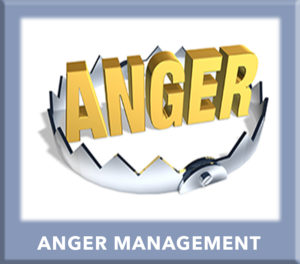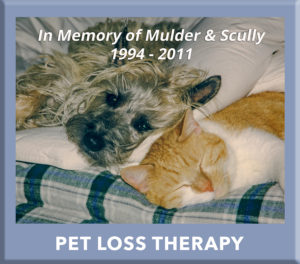COMMON QUESTIONS AND ANSWERS ABOUT PET LOSS
Printed with permission by Susan Dowd Stone, MSW, LCWS @ PetLossHelp.org
1. What is “normal” when grieving the loss of a pet?
Normal emotional grief reactions include denial, inability to accept the loss, intense tearfulness, insomnia, disorientation, disbelief, loss of appetite, anger, isolation, depression, feeling that you will never be the same again, feeling like you are going crazy, feeling you cannot handle the intensity of your reaction and often, accompanying guilt.
Normal behavioral responses can include wanting to sleep with the animal’s blanket or toy, be unable to remove his possessions, a compulsion to memorialize your lost friend and withdrawing from those who do not validate or support the significance of the loss.
2. Guilt – the persistent obsession of pet loss.
Guilt is among the most difficult, common and initial feelings following the loss of an animal. Instead of remembering all we contributed in love and quality to our friend’s life, we focus on self-criticism and condemnation; the times we weren’t there, the time we went on vacation and could not bring our friend, the time we yelled when the steak disappeared from the counter for the third time, that day when finances could not cover $10,000 for life-saving surgery or when boarding/maintaining an equine companion became beyond our financial means and we had to let him go.
We may focus on the times we just couldn’t go on that one last walk, or throw the ball, or wiggle the mouse or when our attention to their emotional needs took a back seat to life’s demands. The most difficult guilt reactions may follow the excruciating decision to euthanize, even when there is no other option! Even those who devoted all to their animal’s life and health can experience devastating guilt. Obsessive thoughts, feelings of self-blame and distorted conclusions can plague us for months even years when there is no logical basis.
3. How long will it take to feel better after pet loss? When will this sadness go away?
There is no timetable for mourning these significant losses. You will mourn in proportion to the quality (not necessarily the length) and significance of your relationship. Those whose animal friends were their only source of companionship may find it very difficult to move ahead. The routine and structure provided by caring for an animal… even one who is very ill… can leave a schedule empty and a home very lonely.
An animal acquired during a happy time in a relationship or memorable life transition can become symbolic of those moments. It may feel like they have taken those memories with them when they die. The bereft person may feel life will never be good again.
This can also be true of those who worked with their animal as professional partners, as well as animals who were the center of family life. You should expect the initially intense feelings to lessen over time, within a few weeks to a few months. Some feel by letting go of grieving they end their bond to their friend. But after mourning comes a peace in which memories are forever present.
4. Common feelings following a decision to euthanize.
Even when abundantly clear and medically indicated, the decision to euthanize can leave bitterness, regret and incredible guilt. Life or death decisions, even when suffering is evident, are not easily made. Second guessing after the fact is common despite the most compelling evidence that this was the most humane option available.
After your companion has died, you may imagine another treatment, another day could have changed the outcome. You would usually be wrong. Often our recollection of those final traumatic moments is unclear and we minimize the reasons that led us to the ethical and humane conclusion because we are overwhelmed with grief. At such times, you may feel that it was your collusion with the medical recommendation that killed the animal, rather than the event or illness that caused the suffering. Again, you would be wrong.
Our intellect and powers of reason take a while to catch up with a broken heart. These precious creatures are not with us very long and the brevity of their lives adds more weight to decisions about terminal care. Euthanasia is one of the most traumatic aspects of pet loss and can become an agonizing distraction from the work of mourning. But it is one final grace we can give for all the comfort they offered us during their life – to end their suffering in a dignified, humane and painless manner.
Ultimately, we do not determine life or death. Most animals who are euthanized by loved ones are facing chronic untreatable illness. It is only a matter of time. The ending of their suffering is a gift we can lovingly bestow before illness/deterioration overtakes them with even worse suffering, and for that last blessing to them, we must willingly bear the agony of associated transient doubt.
5. Available options for memorializing animal companions.
Animal companions can be memorialized in many ways. It is possible to post a tribute on this site or many others devoted to honoring the lives of animal companions. There are some beautiful cemeteries that offer a final resting place for animals, or ashes can be scattered on a favorite trail. Some people keep some or all of the ashes and request to be buried with them when they pass away. You can donate to great causes in their name, volunteer with an animal organization, or write about their lives. You will know and feel what is right for you.
Advocating for animal rights is another option, which can be a great distraction from grief and funnels your pain into positive action. You can set up an area in your home or yard, plant trees, and flowers in memory of your pet, create a photo or video album, and share it with others. There are jewelry stores that will encase photos of your pet in bracelets or pendants. And if you have courage and bravery, there are shelters that desperately need volunteers.
6. When should I adopt another pet? Is it disloyal?
The motivation and timing to invite another animal into your life is very personal. Some people need the spirit of animals around them and feel reduced quality of life without their presence. The capacity to love and deeply appreciate the contributions of sentient beings does not end with their death. It can leave an aching void in empty hearts that nothing else will satisfy.
There is no right or wrong time to adopt a new friend. It is not disloyal to the life of your departed pet to give shelter to another of his brethren, but a way to further honor his place and that of all animals in our lives. Nothing and no other creature will ever replace the deeply bonded experience of your beloved friend. But the heart does not permanently contract with loss, it expands again with the gradual glory of renewal.
Some people, feeling the agony of loss, think they could never go through this again and vow to never have another animal. But once discovered and celebrated in the soul, the capacity and need to love an animal does not go away. There is always the future chance that some other sentient being will move you to offer a home. Decide to not decide now and let things take their course. When the time is right, some sweet and knowing creature may capture you.
7. Unresolved or complicated grief reactions.
Sometimes, the loss of an animal companion occurs within or at the end of a series of other major losses. These can be family members, friends, loss of employment, financial status, loss of health or relationships. The end of the animal’s life may seem like a final ending to your life and can exacerbate clinical depression.
If your symptoms of grief are not resolving and there are no supports in your life to move through a significant series of losses or crises, you may wish to seek professional help. Most communities have mental health centers where services are offered on a sliding scale, so if finances are an issue, or you do not have mental health benefits, please contact mental health agencies in your community.
8. When trauma is a component of pet loss.
Trauma can result in symptoms of PTSD, in which nightmares, obsessive thoughts, panic and recurring memories deny us peace of mind and sleep. We feel irritable, self-critical and ruminate constantly about the same image or circumstance. The decision and witnessing of euthanasia can present a trauma for many people above and beyond the grief of the initial loss. For others, it is a huge comfort to see their companion’s life through to the end.
Witnessing accidental death, or not knowing the whereabouts or status of your animal companion’s life can result in severely traumatic reactions for some people. If symptoms of PTSD or traumatic reactions persist, a consult with a mental health professional is strongly advised.
9. Is there anything I can do to feel better right now?
This is a frequent and understandable question, given the degree of suffering. There is little you can do to abruptly end the intensity of grief, which is appropriate and a normal human process when significant loss occurs. Know that the feelings will grow more tolerable with time, as the legacy of beautiful memories inevitably replaces those of pain. But you can provide some relief to yourself by choosing to recall the better moments and not focusing solely on the death as representing the totality of the relationship.
Take good care of yourself while going through the grieving stages. Do not go too long without sleep, (consult your doctor if your insomnia persists beyond three days), eat properly and stay in contact with those who understand. Join a pet bereavement group, memorialize your friend and distract yourself with visits to loved ones, brief journeys, work, volunteer work if you can manage, and physical exercise. But do not try to bury or hide your grief. It is appropriate and demands expression.
It may feel intolerable now, but you will survive. The day will come when the softness of sweet memories will bring warm smiles of recollection. We are resilient but the agony and intensity of grief responses following pet loss can surprise even those who anticipate how significant the loss will be.
10. I thought I heard, saw, felt my departed pet. Am I out of my mind?
Over the past decade, time and time again, people hesitantly reveal instances where their sense of sight, smell, touch and dreams indicate their departed friend may have been present. They worry about sharing these experiences with anyone else for fear they will be seen as having lost it! They may see a fleeting shadow, hear a soft whinny from the barn, feel a strong presence in the room, or feel little paws walking up the bed. They may dream vividly and feel as if they were briefly reunited with their pet, or the sweet smell of their friend floats through the room. I have heard this from police officers, doctors, teachers, seniors, and children. Could this be real?
Animal companions are spiritual creatures. The Indians of Alaska build “spirit houses” along beautiful overlooks, believing it takes a year for a loved one’s spirit to complete a transition. There is no reason to analyze such experiences. What is real to a person is real. Animals have a mystery, divinity, and majesty that is unknowable at times. Not all in life can be explained.
QUICK LINKS





